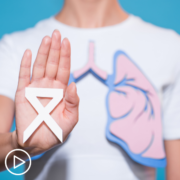Key Advice for Newly Diagnosed Bladder Cancer Patients
Key Advice for Newly Diagnosed Bladder Cancer Patients from Patient Empowerment Network on Vimeo.
When you or a loved one has been diagnosed with bladder cancer, it can feel overwhelming. Where do you start? Bladder cancer expert Dr. Fern Anari shares key advice for newly diagnosed patients.
Dr. Fern M. Anari is a genitourinary medical oncologist and assistant professor in the Department of Hematology/Oncology at Fox Chase Cancer Center. Learn more about Dr. Anari, here.
See More From The Pro-Active Bladder Cancer Patient Toolkit
Related Programs:

|

|

|
Transcript:
Katherine Banwell:
Dr. Anari, what are three key pieces of advice that you have for a patient who has just been diagnosed with bladder cancer?
Dr. Anari:
I think probably my number one piece of advice is come to the first oncology appointment with an open mind and an extra set of ears. I think there’s always a lot of information to digest and cover at that first visit. So, it’s always great to have a loved one there to support you and also absorb the information as well.
Probably another piece of advice is to go somewhere where they can provide you with multidisciplinary care. There’s not just one specialist who treats bladder cancer. Often, we work collaboratively between medical oncology, radiation oncology, and urologic oncology.
So, it’s important that the whole team really works together to formulate the right plan for you. And then lastly, it’s really difficult, but stay positive because I think it’s important to know that no matter what you encounter along the way, your doctor is always going to have a plan for you. So, that’s probably the three most important pieces of advice.










